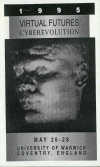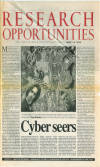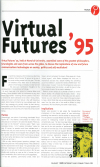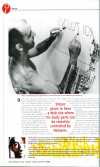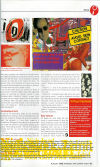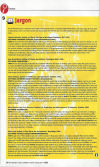Virtual Futures '95: TLS promotional article
[This article was written for a special technology supplement of the Times Literary Supplement. Accompanied by
some nice photos of Stelarc, Orlan & co., it was intended to act (from our point of view) as a promotional blurb for
the conference. The TLS has since steered a path clear of the warps and wormholes of cyberspace.]
At the very worst, we think, at least someone somewhere will survive the
impending catastrophe. Even if we face our own personal extinction, of whatever
form, that naturally means that our brothers shall be saved. So embedded in
global human culture is the over-sophisticated notion of sacrifice, by now
hardwired into us despite a certain redundancy, that it's become almost
impossible to contemplate any kind of 'apocalypse' without the requisite degree
of ironic distance demanded by late twentieth-century culture. "Change," as
they say, "is passé."
To a certain extent, some types of sociological change are redundant,
and unlikely to be seen again. The lexicon wasn't built to withstand its own
undermining by the subterranean creatures which constantly gnaw at its
foundations; having too solid a constitution, it cannot adapt at any great
speed. 'Revolution', 'insurrection', 'discovery', 'invention',
'deconstruction': all these terms had their half-life coded into them already,
and are now visibly in a state of decay. As a sop of comfort, we remind
ourselves that these symptoms are merely somatic; we say that we
currently exist in a state of milleniallist anxiety, and presume some specious
'return to normality' which will occur when this particular war is over. The
socius is at the moment in the middle of a period of "astonishing economic
recovery", as we've learned every six months for the past few years; it's
likely to continue for some time, but, hell, those green shoots are sprouting
all over the place.
Let's think about the actual location of those green shoots, though;
let's think about their material proprietors. The new communitarianism doesn't
focus upon localized attractors of growth operating within larger closed
environments which eventually resolve themselves into an hierarchical whole: it
seems foolish now to suggest that a top-down control mechanism like a
government delegates its responsibilities to subsidiary layers of councils, who
simply implement received procedures. Nor does the Eighties' dream of
prosperity hold for those small enterprises who maintained themselves and the
national economy throughout Thatcher's years in power. And yet it still holds
that small businesses appear to be supporting local economies, though these
businesses have a less reliable legal status nowadays. The 'man in the street'
has proclaimed his view that the cities are actually run by drug barons so
often that his view even found its way into a recent edition of Panorama.
So, with our impoverished vocabularies, we scrape around for ways of
contextualizing the postmodern experience; we try to reconcile our naive hopes
for a gradual return to a more familiar world with our sense that molar control
has already been supplanted by molecular flows; we attempt to understand that
rates of change are themselves accelerating beyond the point of our
understanding. We strap ourselves in, and knowing that the machine moves faster
than our brains can process the information it feeds us, we pray that we'll
survive the ride intact. However, just as the future approaches us at an
increasing rate, so the past recedes further and further beyond our reach.
Dreams of survival are always valid, but the idea of surviving intact presumes
a destination. The absence of such a transcendental plane is a frightening
prospect, not least for those suffering from the more traditional forms of
apocalypsitis who claim that the apocalypse has already occurred, and that we
are now quite literally 'in hell'. The realization that there was no journey,
no departure and arrival, but that the destination came to us at some
undetermined point in time disrupts that age-old notion of sacrifice, insofar
as "no-one here gets out alive."
The phenomenon in theoretical science which we have become accustomed
to calling the gestalt-induced paradigm shift, thanks to Thomas Kuhn's "The
Structure of Scientific Revolutions", is now often observed by cultural
theorists and sociologists in their own fields of enquiry. We might say that
the phase change most pertinent to this and the last few centuries was that
from the Newtonian gravity-based paradigm to Einsteinian notions of relativity;
or, delving further into the past, we could focus upon the way in which Galileo
ostensibly reconfigured our ideas of a previously Ptolemaic cosmos. It seems
expedient now, too, to moot some kind of radical shift in cosmic perception,
which takes into account the fact that we have to reacquaint ourselves with our
own ever-mutating world more and more often. It's frequently remarked that
mediated violence is being ingested in larger and larger doses, using ever more
diverse and more effective means; addiction is astonishingly efficient in the
ways in which it manages to perpetuate its own existence. The addiction-meme is
a parasitic entity that creates suitable conditions for its own survival: its
optimal 'fitness landscape', we might say. Map this notion onto the machines
and technologies that currently form the focal point for our apocalytic fears,
and the logical next step is to observe, first of all, that we are no longer
in control. Machines use us as their reproductive organs; contemporary
technological society imposes its constraints upon the body, and manipulates
the human for the facilitation of its own desires. For many (especially the
more 'human' amongst us), this isn't a particularly pleasant thought.
-------------------------------------------
Stelarc is an Australian performance artist who is currently finding
himself to be increasingly in the public eye, not simply because of the
interest of the art world or the media, but also because of the interest
expressed by a growing number of philosophers who have in common primarily what
might at first glance seem an almost fetishistic relation with modern
technologies. Indeed, the colonization of "cyberculture" by the popular media
has tended to assume the trivial and ignore the substantial in the works of a
number of artists and philosophers who might be conveniently categorised using
the prefix "cyber-". Stelarc himself, whilst expressing an interest in the
academic antecedents of this line of thought, remains less a bastion of active
enquiry into the more philosophical realms of cybernetics than a mere
mechanized freak-show, as far as many of those acquainted with his public image
are concerned. What's often overlooked is that, in using such items as robotic
prostheses as a central element of performance, Stelarc is not only suggesting
the possibilities of human interaction with machines, but also delimiting the
parameters both of the technology and of the body. This too solid flesh has its
limitations already coded into it in much the same way as the lexicon.
Manuel DeLanda, in his "War in the Age of Intelligent Machines",
hypothesizes the future existence of some kind of robot historian, whose job it
would be to track the evolution of his own machinic species. One of the
implications of this hypothesis would have to be, as I've said above, that the
human would be regarded much as a tool, a useful device which the machinic
phylum puts to its own use. We are more accustomed to the idea that machines
are made by man, for man, to produce a particular series of effects: man
intends the machine to serve a specific function which he ordains. DeLanda
assumes the possibility that machines could make other machines to serve
themselves: that doesn't sound so far-fetched an idea anymore, in an age in
which computer viruses replicate and mutate in order to survive and fulfil
their destructive functions. It's not the job of philosophy to ask, what would
these mechanistic offspring look like, but rather to ask questions such as:
what purpose are they likely to serve? Would they provide definitions of
themselves, for themselves? Would they recognise such notions of purpose
(desire) or definition (knowledge)? Such concerns eventually become merely
problems of translation between the material and the immaterial. Current
technologies necessitate a redefinition of the notion of materialism in the
light of the increasingly pliable form of mundane matter, and the apparently
imminent shift of the dominant reality into an immaterial, 'virtual' realm.
A recent review in one of the daily broadsheets described a show by the
artist Maggie Roberts as opening a "window into the horrifying heart of
cyberspace." It's worth noticing the tacit acknowledgment in popular culture
that this space is actually materially there to be accessed, and that,
with the aid of such technologies, we are merely revealing more and more points
of entry. However, these doors into virtual realms are inevitably also lines of
escape; nevertheless, as every child who has ever played on a Nintendo console
knows, the ability to navigate this type of space is becoming indispensable.
Could it be that what is emerging is simply a tactical program for survival
which just happens to involve the purging of that most notorious corporeal
parasite of the genome, the body itself?
